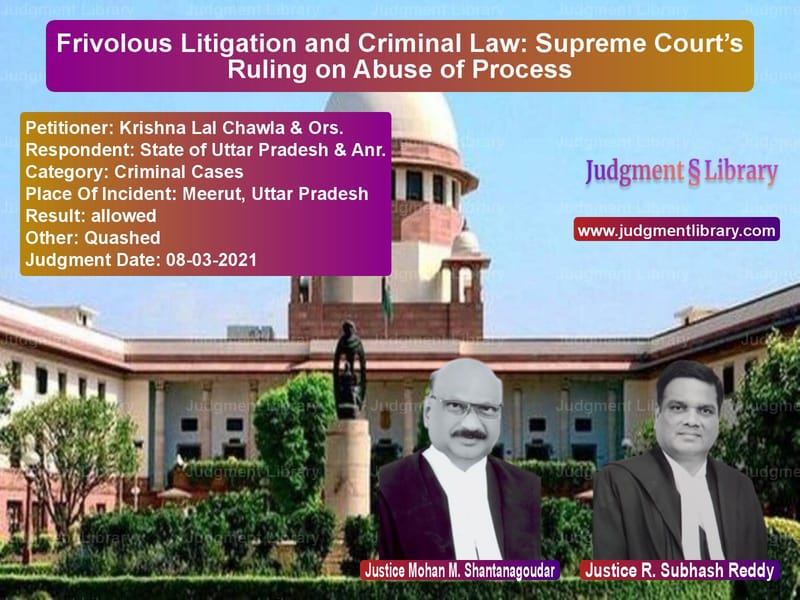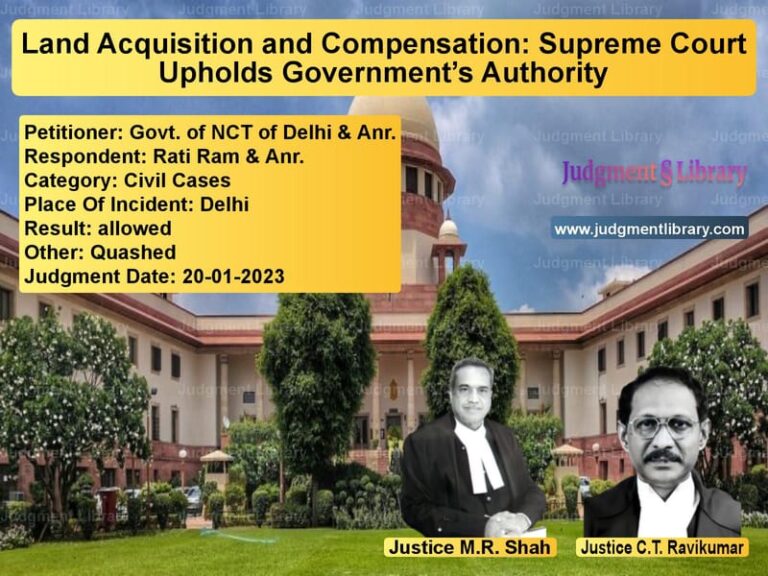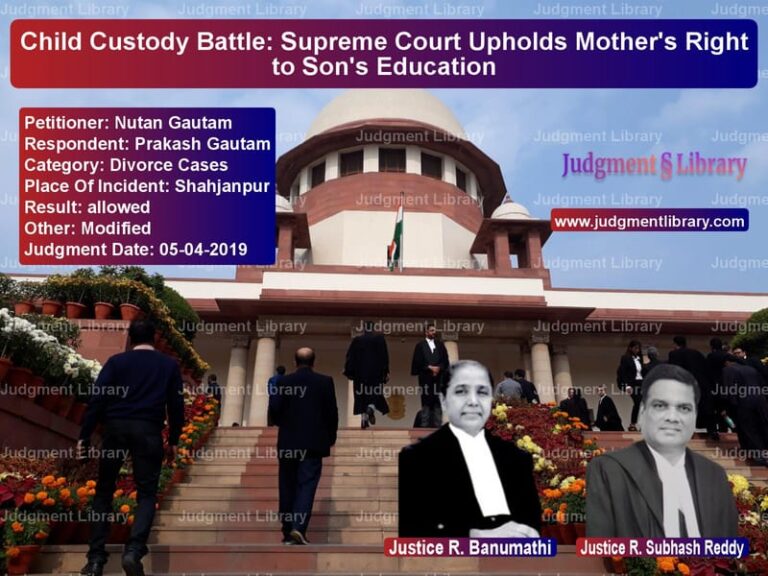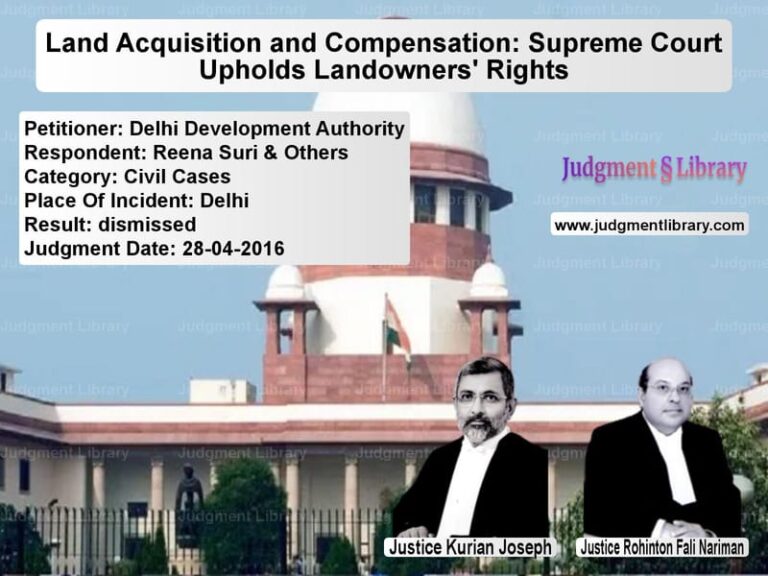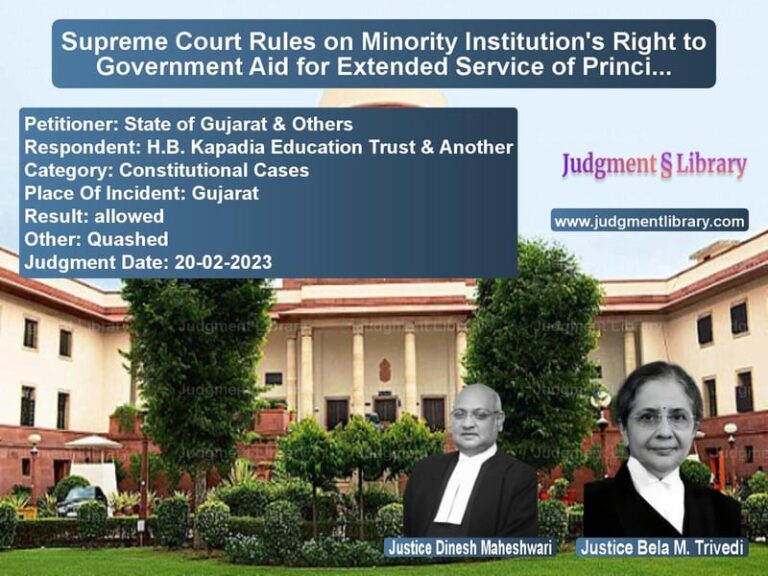Frivolous Litigation and Criminal Law: Supreme Court’s Ruling on Abuse of Process
The case of Krishna Lal Chawla & Ors. vs. State of Uttar Pradesh & Anr. is a landmark ruling by the Supreme Court of India that addressed the issue of frivolous litigation and abuse of the criminal justice system. The case stemmed from a long-standing dispute between neighbors, which led to multiple criminal complaints being filed against each other. The Supreme Court’s ruling in this case reinforced the principles of fair trial, judicial efficiency, and the fundamental right to liberty under Article 21 of the Constitution.
The ruling emphasized that courts must proactively curb vexatious litigation, which burdens the judicial system and harasses individuals. It reiterated that criminal proceedings cannot be allowed to become a tool for personal vendetta.
Background of the Case
The dispute arose between two neighbors, the appellants (Krishna Lal Chawla and others) and the second respondent. Their conflicts date back to 2006, when a mutual settlement took place. However, disagreements persisted, leading to a physical altercation on August 5, 2012. The second respondent lodged a complaint against the appellants, alleging that they assaulted him and his wife with iron rods and threatened their lives.
The timeline of events:
- August 5, 2012: NCR No. 158/2012 was filed against the appellants for offenses under Sections 323, 504, and 506 IPC.
- August 5, 2012: The appellants’ son filed NCR No. 160/2012 against the second respondent, counter-alleging assault and threats.
- 2017: The appellants sought permission under Section 155(2) CrPC for police investigation. FIR No. 283/2017 was registered, leading to a charge sheet against the second respondent.
- May 11, 2018: The second respondent filed a fresh private complaint under Section 200 CrPC, adding new allegations against the appellants.
- April 4, 2019: The Magistrate issued process against the appellants based on the private complaint.
- January 13, 2020: The Sessions Judge upheld the summons issued by the Magistrate.
- September 28, 2020: The Allahabad High Court dismissed the appellants’ plea to quash the proceedings.
Legal Issues Raised
1. Abuse of Criminal Law for Harassment
The appellants argued that the second respondent’s fresh complaint was an attempt to harass them, as it added exaggerated allegations years after the original complaint.
2. Validity of Successive Complaints on the Same Incident
The appellants contended that filing a fresh complaint on the same facts was impermissible and amounted to an abuse of process.
3. The Role of Magistrates in Preventing Frivolous Complaints
The case questioned the duty of trial courts to scrutinize complaints and prevent vexatious litigants from misusing the legal system.
Supreme Court’s Observations
The Supreme Court made several crucial observations:
- The fresh complaint by the second respondent was an attempt to “improve” the original allegations and included fabricated elements.
- The Magistrate and Sessions Judge erred in allowing a second complaint based on the same incident.
- Allowing such complaints would result in multiple criminal proceedings for the same offense, violating the right to life and liberty under Article 21 of the Constitution.
- The Magistrate failed to exercise due diligence in preventing abuse of process.
The Court reaffirmed the principle laid down in T.T. Antony v. State of Kerala (2001), which held that multiple FIRs for the same offense violate Article 21.
Final Verdict
The Supreme Court quashed all criminal proceedings arising from the dispute, ruling that:
- The second complaint by the respondent was frivolous and motivated by malice.
- The Magistrate’s order issuing summons against the appellants was invalid.
- The High Court’s order dismissing the appellants’ plea was set aside.
- All pending criminal cases related to the dispute were quashed to prevent further harassment.
Implications of the Judgment
This ruling has significant implications for criminal law and judicial efficiency:
- Courts Must Prevent Abuse of Process: Magistrates must scrutinize complaints before issuing summons.
- Protection Against Repeated Prosecutions: Individuals cannot be subjected to multiple complaints for the same offense.
- Judicial Economy: Preventing frivolous litigation reduces the backlog of cases.
- Right to Life and Liberty: Prolonged litigation on the same issue violates fundamental rights.
The judgment reinforces the principle that criminal proceedings should not be used as a tool for harassment and ensures that justice is not diluted by baseless complaints.
Petitioner Name: Krishna Lal Chawla & Ors..Respondent Name: State of Uttar Pradesh & Anr..Judgment By: Justice Mohan M. Shantanagoudar, Justice R. Subhash Reddy.Place Of Incident: Meerut, Uttar Pradesh.Judgment Date: 08-03-2021.
Don’t miss out on the full details! Download the complete judgment in PDF format below and gain valuable insights instantly!
Download Judgment: krishna-lal-chawla-&-vs-state-of-uttar-prade-supreme-court-of-india-judgment-dated-08-03-2021.pdf
Directly Download Judgment: Directly download this Judgment
See all petitions in Bail and Anticipatory Bail
See all petitions in Fraud and Forgery
See all petitions in Judgment by Mohan M. Shantanagoudar
See all petitions in Judgment by R. Subhash Reddy
See all petitions in allowed
See all petitions in Quashed
See all petitions in supreme court of India judgments March 2021
See all petitions in 2021 judgments
See all posts in Criminal Cases Category
See all allowed petitions in Criminal Cases Category
See all Dismissed petitions in Criminal Cases Category
See all partially allowed petitions in Criminal Cases Category

